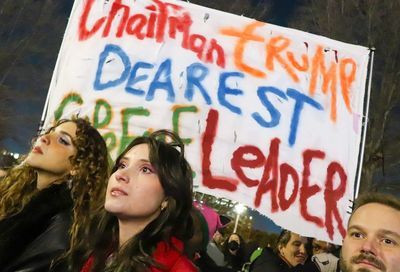In today’s Metro Weekly, I lay out a path forward in “Absent Update” for President Obama’s stalled evolution on marriage equality. Definitely go read that first, but, of note for the point of this post, I write in part:
[O]nce the [U.S. Court of Appeals for the] Ninth Circuit rules in Perry [v. Brown], and the dissatisfied party asks the Supreme Court to take the case, a problem — LGBT supporters and allies’ growing impatience that the president hasn’t finished “evolving” – can become an opportunity.
As when the president announced – belatedly for some – the decision that he would no longer be defending [the Defense of Marriage Act] in the context of two lawsuits filed in trial courts within the U.S. Court of Appeals for the Second Circuit, the president could use the Proposition 8 appeal to lay out the legal and constitutional basis for completing his evolution on marriage equality.
By filing an amicus (friend of the court) brief supporting the plaintiffs who are challenging Proposition 8[.]
The process by which the Supreme Court accepts cases is called certiorari, and some further explanation about this portion of the process is helpful for those interested but not necessary for the purpose of the analysis set forth in “Absent Update.”
 When the Perry case is decided by the Ninth Circuit, the losing party almost certainly will seek certiorari, shortened to “cert” by lawyers and those familiar with the Supreme Court’s workings. The party successful at the Ninth Circuit will have the opportunity to file a brief supporting or opposing that cert petition. Outside groups and individuals who are not party to the case can file amicus briefs at this stage.
When the Perry case is decided by the Ninth Circuit, the losing party almost certainly will seek certiorari, shortened to “cert” by lawyers and those familiar with the Supreme Court’s workings. The party successful at the Ninth Circuit will have the opportunity to file a brief supporting or opposing that cert petition. Outside groups and individuals who are not party to the case can file amicus briefs at this stage.
Then, the justices meet and decide whether to hear the case. If four justices vote to grant cert, then the case will be accepted for appeal and another round of “merits” briefing begins with the parties and amicus filers. Then, oral arguments are scheduled and held. Then, the justices meet again to discuss and vote on the case. Then, opinions are written, circulated, edited or re-written, and — at long last — a decision (and other opinions) is handed down.
The United States (i.e., the Obama administration) — through the Solicitor General’s Office, which is a part of the Department of Justice — can involve itself in this process at the cert or merits stage, and is sometimes even asked to do so by the justices themselves.
If Obama were to decide to support the plaintiffs who are challenging the constitutionality of Proposition 8, the solicitor general could file a brief at the cert stage urging one of three paths, depending on the Ninth Circuit decision and the party seeking cert:
- If the trial court decision finding Proposition 8 to be unconstitutional is upheld by the Ninth Circuit (either because the proponents are found to lack standing to appeal or on the merits), the Obama administration could argue that the Ninth Circuit was correct and that there is no need for the court to accept the appeal.
- Or, assuming the same Ninth Circuit outcome, the administration could argue that the Ninth Circuit was correct and the decision should be affirmed by the Supreme Court so as to expand the ruling to apply across the country.
- If, however, the Ninth Circuit decides that the trial court was incorrect and that Proposition 8 is constitutional, the solicitor general could urge the Supreme Court to accept the case and hold, once and for all, that Proposition 8 is unconstitutional.
There are several drawbacks to all three of these options, most importantly the choice between options 1 and 2, which will doubtless be an interesting debate within the LGBT community and which the administration might wisely wish to avoid. Option 3 has less of a drawback, but it also is the least likely scenario imagined by legal scholars for the Ninth Circuit’s outcome.
Accordingly, engaging at the merits stage — assuming the Supreme Court accepts cert — would appear to be the prime time for the administration to file a brief supporting the plaintiffs. The court will have, at that point, already declared its desire to decide the issue and, as such, the administration should weigh in on such an important case with its view.
 This, however, raises the issue of timing. The Ninth Circuit has no timeline. It can rule when it wishes to do so. That said, the court has fast-tracked several elements of the appeal already, and the American Foundation for Equal Rights, which brought the case, already has announced what its plans are for addressing media questions when the decision comes down.
This, however, raises the issue of timing. The Ninth Circuit has no timeline. It can rule when it wishes to do so. That said, the court has fast-tracked several elements of the appeal already, and the American Foundation for Equal Rights, which brought the case, already has announced what its plans are for addressing media questions when the decision comes down.
Because of the length of the cert process, it’s entirely possible that the decision to file a merits amicus brief will not come until after the election. As such, there’s no reason why the president can’t announce the completion of his evolution when the Ninth Circuit decision is issued by announcing his intention — assuming it upholds the trial court decision striking down Proposition 8 — to do all he can to ensure the ruling stands, including by filing an amicus brief in support of the decision should the Supreme Court accept the case.
Time is moving forward, and every day a greater majority of the American people believe that same-sex couples deserve the same rights to marriage as opposite-sex couples. The easiest path for Obama may be to wait until after the election, as some observers expect, to announce a completed evolution. That is safe, but it carries both the risk of losing the opportunity should he lose the election and losing the moment should the electorate and country continue to move at a breakneck pace to accept same-sex couples as a part of the American fabric deserving of the full recognition and protections of marriage.
The choice to finish evolving is President Obama’s to make, but, in the meantime, the questions are not going to stop.
[Photo, above right: The Supreme Court of the United States building. (Photo by Chris Geidner.) Photo above left: President Obama at the White House’s LGBT Pride Month Reception in 2011. (Photo by Ward Morrison.)]




 This, however, raises the issue of timing. The Ninth Circuit has no timeline. It can rule when it wishes to do so. That said, the court has fast-tracked several elements of the appeal already, and the American Foundation for Equal Rights, which brought the case, already has announced what its plans are for addressing media questions when the decision comes down.
This, however, raises the issue of timing. The Ninth Circuit has no timeline. It can rule when it wishes to do so. That said, the court has fast-tracked several elements of the appeal already, and the American Foundation for Equal Rights, which brought the case, already has announced what its plans are for addressing media questions when the decision comes down.


















